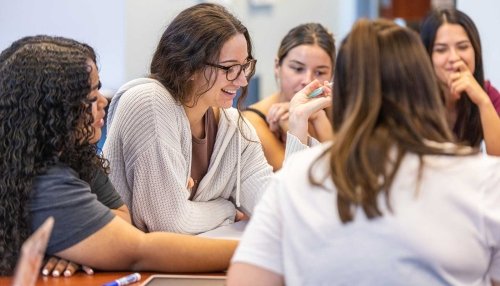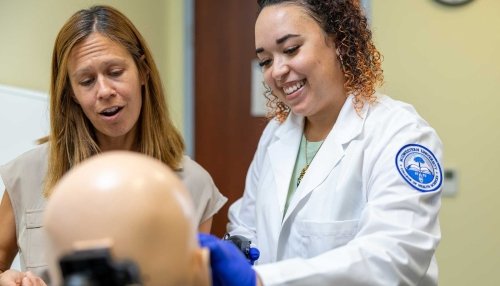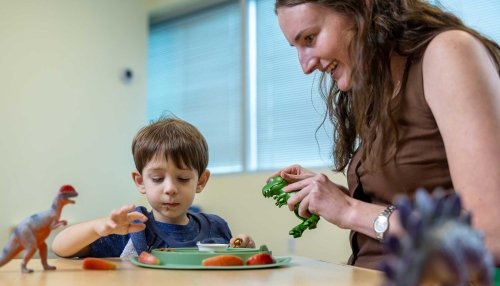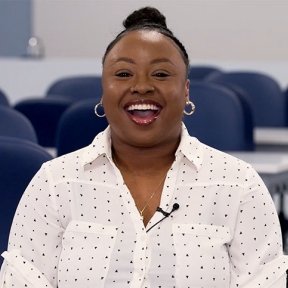Offered through the College of Health Sciences, Glendale Campus
At Midwestern University Speech-Language Pathology Program, you will learn how to become an effective, caring clinician who learns, adapts, and works as part of the healthcare team. As a Speech-Language Pathologist, you will be able to make a profound impact on individuals' lives by helping them overcome communication challenges, swallowing disorders, and more.
Student-Centered Curriculum and Mentorship
Our Speech-Language Pathology Program provides a student-centered curriculum and mentorship that guide you in developing proficiency in aiding adults and children with communication disorders. Beyond knowledge, we cultivate critical thinking, problem-solving, and self-confidence. These traits are essential for becoming an empathetic, patient-centered professional on tomorrow's healthcare team.
Comprehensive Educational Pathway
Our program offers an integrated educational pathway that combines academic, research, and clinical experiences. The ultimate goal is to earn a Master of Science (M.S.) in Speech-Language Pathology degree.
Ready for Practice
Graduates of the Midwestern University Speech-Language Pathology Program are well-prepared for roles as speech-language pathologists in healthcare and educational settings. The field of speech-language pathology offers a wide array of career opportunities, allowing professionals to make a meaningful difference in the lives of those they serve.
Learn More
Learn more about the requirements and find quick links to relevant catalog content to guide you in your application process.
The Speech-Language Pathology (SLP) Program offers incoming students the opportunity to matriculate into two different tracks:
Traditional Track
The Traditional Track is for applicants with baccalaureate degrees from a regionally-accredited institution in Communication Sciences and Disorders, or for those with baccalaureate degrees from a regionally-accredited institution in an area other than Communication Sciences and Disorders with completion of prerequisite coursework in the following areas:
- Anatomy and Physiology of Communication Mechanisms*
- Phonetics*
- Speech-Language Development*
- Speech and/or Hearing Science*
- Statistics
- Biological Sciences
- Physical Sciences (physics or chemistry)
- Social Sciences
*Individuals lacking starred SLP-specific prerequisite courses may apply to the Leveling Track to complete these courses online with no additional tuition for those who successfully matriculate into the Fall quarter.
Full List of Requirements for Traditional Track*
*Subject to change
Leveling Track
Individuals who do not meet the minimum requirements for the Traditional Track may qualify for admission to the Speech-Language Pathology Program Leveling Track. Leveling Track students begin coursework one quarter early (Summer) completing SLP-specific prerequisite coursework online. They matriculate on campus the following Fall quarter.
These applicants must meet all admission requirements for the Leveling Track and demonstrate completion of a baccalaureate degree from a regionally-accredited institution with completion of prerequisite coursework in the following areas:
Statistics
Biological Sciences
Physical Sciences (physics and chemistry)
Social Sciences
Full List of Requirements for Leveling Track*
*Subject to change
The Midwestern University Speech-Language Pathology Program's mission is to mentor intellectually curious and compassionate students to be effective, reflective, and collaborative Speech-Language Pathologists serving their communities.
The Speech-Language Pathology Program provides academic, research, and clinical experiences that culminate in the Master of Science (M.S.) in Speech-Language Pathology degree.
The program of study spans seven quarters of study, with degree completion targeted for 21 months.
A 24-month Leveling Track option is available for students without a bachelor’s degree in Communication Sciences and Disorders.
In the Traditional Track, five quarters of didactic coursework are followed by two quarters of advanced practicum experiences.
All students complete a master’s thesis or an evidence-based capstone project.
Midwestern University Speech-Language Pathology Program graduates are prepared for positions as speech-language pathologists in healthcare and educational settings.
- Students complete one quarter of didactic coursework in the Fall Quarter; in subsequent quarters, they continue with didactic curriculum while also engaging in four quarters of practica at the Speech-Language Institute – the Speech Language Pathology (SLP) Program’s on-campus, University clinic.
- In their last two quarters, students engage in two full-time advanced practica (internships) of up to twelve weeks' duration in cities of choice across the country, or in one of many rotations within the greater Phoenix area (e.g., hospital settings such as Mayo Clinic, Barrow Neurological Institute, Banner Health; private practice settings offering interprofessional practice opportunities; and placements within Arizona's highest-ranking schools).
- Program duration is 21 months from start to finish.
New: The SLP Program now offers a Leveling Track option for students with baccalaureate degrees in fields other than Communication Sciences and Disorders and/or for those who lack SLP-specific prerequisite coursework.
- Leveling Track students begin one quarter early (Summer) online to complete the following SLP-specific prerequisite courses: Anatomy and Physiology of Communication Mechanisms, Phonetics, Speech and Language Development, and Speech and Hearing Science – at no additional cost.
- Leveling Track students continue coursework in the Fall Quarter all on-campus following the traditional track curriculum.
- Program duration is 24 months for Leveling Track students.
*Subject to change
Program Objectives
The Master of Science in Speech-Language Pathology Program seeks to:
- Foster a supportive learning environment for students;
- Foster a collaborative and compassionate approach to patient care;
- Graduate competent speech-language pathologists who possess the levels of clinical judgment, knowledge, empathy, technical skills, and confidence to begin professional practice with a culturally and linguistically diverse society;
- Foster a philosophy of lifelong learning in speech-language pathology students;
- Expand clinical practice in the Midwestern University Speech-Language Institute to provide speech-language pathology students with a broad range of evidence-based and interprofessional practice experiences;
- Advance the knowledge base of the profession through research and support of students' scholarly activities;
- Contribute to the overall growth and academic excellence of Midwestern University by supporting its Mission and Vision.
Mission
The Midwestern University Speech-Language Pathology Program's mission is to mentor intellectually curious and compassionate students to be effective, reflective, and collaborative Speech-Language Pathologists serving their communities.
Vision
The Midwestern University Speech-Language Pathology program works collaboratively in a health-oriented university to integrate academic teaching and diverse clinical experiences to develop effective clinicians through:
- Interprofessional practice
- Innovative technology experiences
- Clinical simulation opportunities
- Culturally and linguistically diverse clinical experiences
- Scholarly activity
- Individualized, intentional mentorship
- Comprehensive and dynamic instruction
- Clinical, academic, and community partnership
Speech-Language Pathology students at Midwestern University experience:
Individualized, Intentional Mentorship
Faculty advocacy from academic and clinical SLP professionals who foster students’ knowledge, skills, and unique potential through...
- Four quarters of diverse, personalized clinical rotations in the on-campus Speech Language Institute with experienced and caring Midwestern University clinical faculty (7:1 or less student to faculty ratio).
- An individually mentored Thesis or Capstone project in the student’s area of interest.
- Quality academic advising by SLP faculty who support each student’s professional development.
Excellence in Teaching and Learning
Hands-On Learning
- Human brain dissection, voice prosection, laryngeal imaging.
- Standardized patient encounters (assessment and treatment with actors trained to portray individuals with communication disorders).
State-of-the-Art Technology
- Virtual clinical cases and a University Simulation Center with high fidelity mannequins offering real-world student experiences with low incidence disorders.
- An innovative, on-campus clinic (Speech-Language Institute) with extensive student and faculty resources, such as the Computerized Assisted Rehabilitation Environment (CAREN), providing opportunities for implementation of interprofessional rehabilitation and research.
Quality Person-Centered Outcomes for Current & Future Clients Through…
Interprofessional Education
- Complete grand rounds, courses, and labs with other future allied healthcare professionals preparing students for interprofessional practice
- Deliver collaborative, patient-centered care with (Physical Therapists, Occupational Therapists, Clinical Psychologists, Vision Therapists) in the Midwestern University Therapy Institute.
Unique Clinical Experiences
- Intensive evidence-based treatment programs in on-campus clinic and mini-rotations in underserved areas of the community
- Two full-time advanced practicum rotations (internships) in cities of choice across the country or in one of many rotations within the greater Phoenix area (e.g. Mayo Clinic, Barrow Neurological Institute, private practice settings, and placements within Arizona's highest ranking school districts).
- Students engage in practica at the Speech-Language Institute, housed in the Midwestern University Therapy Institute, and other community-based settings for four quarters.
- Two advanced practica of up to 12 weeks duration are completed in educational and health settings.
- Our program is affiliated with public and private schools, inpatient rehabilitation hospitals, outpatient rehabilitation hospitals and facilities, and private practice clinics to ensure a range of practicum opportunities for every Midwestern student.
As an MWU student, you may qualify for a scholarship opportunity if your interest includes working with children. Visit the TAG Scholars Program website for more details.
Visit our Scholarships page to explore other opportunities.
Speech-language pathologist continues to be one of the top rated professions in the United States based upon growth of the profession, available jobs, and starting salaries.
U.S. News and World Report (1) has consistently ranked this profession as one of the most desirable social service jobs in America.
The U.S. Department of Labor Statistics (2) predicts that the number of speech-language pathologists will grow by 21% over the next 10 years. That translates to approximately 34,000 new therapist positions by 2031. The national median speech-language pathologist salary is $79,060 per year, or approximately $38 per hour.
(1) U.S. News and World Report, https://money.usnews.com/careers/best-jobs/speech-language-pathologist
(2) U.S. Bureau of Labor Statistics, Office of Occupational Statistics and Employment Projections, PSB Suite 2135, 2 Massachusetts Avenue, NE Washington, DC 20212-0001, Phone: 1-202-691-5700, https://www.bls.gov/ooh/healthcare/speech-language-pathologists.htm
Midwestern University is accredited by The Higher Learning Commission, a Commission of the North Central Association of Colleges and Schools (HLC/NCA), 230 South LaSalle Street, Suite 7-500, Chicago, IL 60604-1413.
Speech-Language Pathology programs are accredited by the Council on Academic Accreditation (CAA) of the American Speech-Language-Hearing Association (ASHA).
The Master of Science (M.S.) education program in Speech-Language Pathology (SLP) {residential} at Midwestern University, Glendale is accredited by the Council of Academic Accreditation in Audiology and Speech-Language Pathology of the American Speech-Language-Hearing Association, 2200 Research Boulevard, #310, Rockville, MD 20850; 800-498-2071 or 301-296-5700.
Academic Course Catalog
Explore details regarding your specific College/Program (subject to change).
Student Outcome Data and Class Profile
Student Outcome Data
Student outcome data for Speech-Language program at Glendale campus includes program completion rates, Praxis examination pass rates, and graduate employment rates.
| Outcome | Academic Year 2019-2020 | Academic Year 2020-2021 | Academic Year 2021-2022 | Academic Year 2022-2023 | Academic Year 2023-2024 |
|---|---|---|---|---|---|
| Number of students completing the program in the expected time frame | 50 | 47 | 47 | 47 | 49 |
| Percentage of students completing the program in the expected time frame | 100% | 98% | 96% | 98% | 100% |
| Outcome | Academic Year 2018-2019 | Academic Year 2019-2020 | Academic Year 2020-2021 | Academic Year 2021-2022 | Academic Year 2022-2023 | Academic Year 2023-2024 |
|---|---|---|---|---|---|---|
| Number of students taking the Praxis Exam | 49 | 50 | 48 | 49 | 47 | 48 |
| Number of students that passed the Praxis Exam | 49 | 50 | 48 | 49 | 47 | 48 |
| Percent Pass Rate | 100% | 100% | 100% | 100% | 100% | 100% |
| Outcome | Academic Year 2018-2019 | Academic Year 2019-2020 | Academic Year 2020-2021 | Academic Year 2021-2022 | Academic Year 2022-2023 |
|---|---|---|---|---|---|
| Number of graduates employed | 49 | 47 | 48 | 49 | 48 |
| Percentage of students employed | 98% | 94% | 100% | 100% | 100% |
Class Profile
Class of 2026
- Female: 98%
- Male: 2%
- Average overall GPA: 3.47
| Profile | 2019-2020 | 2020-2021 | 2021-2022 | 2022-2023 | 2023-2024 | 2024-2025 |
|---|---|---|---|---|---|---|
| Number of students admitted | 50 | 50 | 49 | 51 | 48 | 47 |
| Average incoming overall GPA | 3.36 | 3.39 | 3.30 | 3.47 | 3.45 | 3.47 |
| Average incoming major GPA | 3.47 | 3.47 | 3.44 | 3.58 | 3.45 | 3.6 |
Hear our Stories
Taylor Alflen, College of Health Sciences, Arizona, Speech-Language Pathology Program, Class of 2024
“Not many people are aware of what a speech-language pathologist does and can do. It is so helpful to have practice talking with and educating other fields about our skills.”

Destinee Bohannon, Speech-Language Pathology Program, Class of 2025
“I think the leveling courses are great for students that do not have an undergraduate degree in speech pathology because it really lays down the foundational knowledge.”




